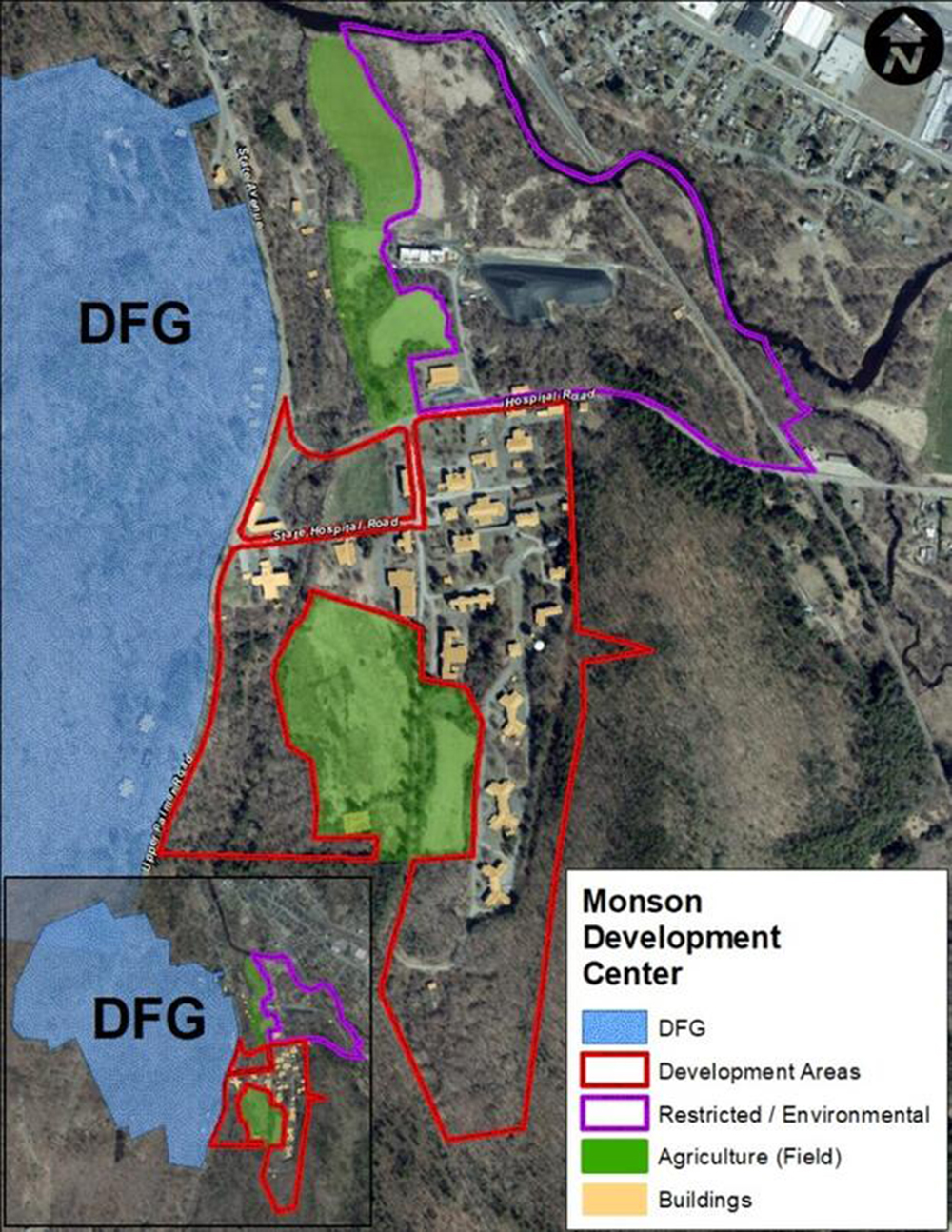Healey-Driscoll Administration transfers Monson Campus to Westmass Area Dev. for housing, economic development
 Monson, MA The Healey-Driscoll Administration advanced the development of at least 600 housing units and other uses on the former Monson Developmental Center Campus by initiating the transfer of over 100 acres of the campus to Westmass Area Development Corp. The administration also reaffirmed its commitment to an ongoing partnership with Westmass and local leaders to secure funding and resources needed for a successful redevelopment.
Monson, MA The Healey-Driscoll Administration advanced the development of at least 600 housing units and other uses on the former Monson Developmental Center Campus by initiating the transfer of over 100 acres of the campus to Westmass Area Development Corp. The administration also reaffirmed its commitment to an ongoing partnership with Westmass and local leaders to secure funding and resources needed for a successful redevelopment.
“This is a great opportunity for Monson, the region and the state, as this site offers major housing and economic development potential. This transfer demonstrates our focus on utilizing existing properties to build more housing, provide new opportunities for local businesses, and lower costs,” said governor Maura Healey. “Our administration is committed to supporting Westmass and the town in order to maximize that potential.”
“This campus has stood vacant and not contributing back to the community for far too long. Activating a campus of this size in a rural area will unlock sustainable economic growth,” said lieutenant governor Kim Driscoll. “Our administration is tackling the housing crisis head-on, and this redevelopment will be transformative for the town.”
The Division of Capital Asset Management and Maintenance (DCAMM) will complete this transfer with authorization established in section 54 of chapter 206 of the acts of 2024, conveying the land for $1 in exchange for the redevelopment of the site into several hundred housing units. With the transfer initiated, Westmass, in consultation with DCAMM, will now begin to ready the site for redevelopment.
The Healey-Driscoll Administration will also provide a $9 million site readiness grant to Westmass, authorized by the Massachusetts legislature, to help ensure an expeditious path to construction. Given the size of the site, significant funding is needed to prepare for redevelopment through demolition, environmental remediation, and infrastructure improvements. In addition to announcing the transfer initiation today, the administration will continue to work with Westmass to identify additional funding sources to advance the redevelopment.
“The Healey-Driscoll Administration is working hard to end our state’s housing shortage, and we need strong partnerships that will help us act quickly to unlock housing production and build the hundreds of thousands of units this crisis demands,” said Ed Augustus, secretary of the Massachusetts Executive Office of Housing and Livable Communities. “It’s crucial to help move projects like this forward, and the Westmass Monson Campus redevelopment will provide needed homes for local Monson residents and spur economic growth with new jobs and revenue.”
“This redevelopment is a prime example of how we are leveraging underutilized state assets to address housing issues and drive economic growth in communities across Massachusetts,” said interim Economic Development secretary Ashley Stolba. “This is a long-term solution and we are backing it with a long-term commitment to provide through sustained funding to prepare the site and unlock its full potential.”
“On behalf of the Healey-Driscoll administration, we are excited to find a partner like Westmass to redevelop a campus that has been vacant since 2012,” said DCAMM commissioner Adam Baacke. “With a beautiful setting, proximity to transportation infrastructure and a welcoming municipality, having a mission-driven master developer with a great track record taking control of the property can be the final piece to leverage the tremendous potential of this site for both housing production and economic development.”
Following the site readiness work, Westmass expects to make individual development sites available to a variety of partners to implement this large project. Under the terms of the disposition agreement, DCAMM and Westmass anticipate the construction of at least 600 new units of housing as well as commercial/industrial uses to expand the Monson tax base and create employment opportunities.
In addition to the development areas, another 458 acres of the campus are being prepared for transfer to the Department of Fish and Game for conversation and recreation purposes and 42 acres will remain under the care and control of the Department of Agricultural Resources for active farming.
A demolition project isunderway to remove abandoned and deteriorating structures from the property. More information and a map of the site are available on DCAMM’s project page.
“Westmass Area Development Corp. is committed to transforming the Monson Development Center into a vibrant, mixed-use community that meets the housing and economic development needs of the region. Through strategic planning, strong public-private partnerships, and phased redevelopment, Westmass will remediate, repurpose, and revitalize the long-dormant site in a way that complements and maintains the Town of Monson’s character,” said Westmass president and CEO Jeff Daley. “We are excited to begin this long-overdue project. The strong leadership and commitment from the Healey-Driscoll Administration has made this opportunity possible by identifying the Monson Development Center as a site that can deliver meaningful impact through much-needed housing and economic development. Westmass is proud to take the lead in transforming this former dormant state property into a revitalized part of the community that will benefit Monson and the region for generations to come.”
Atlantic Property Management expands facilities maintenance platform: Assigned two new facility management contracts in RI


Unlocking value for commercial real estate: Solar solutions for a changing market - by Claire Broido Johnson

New Quonset pier supports small businesses and economic growth - by Steven J. King

Tenant Estoppel certificates: Navigating risks, responses and leverage - by Laura Kaplan


 (1).png)







 (1).png)
